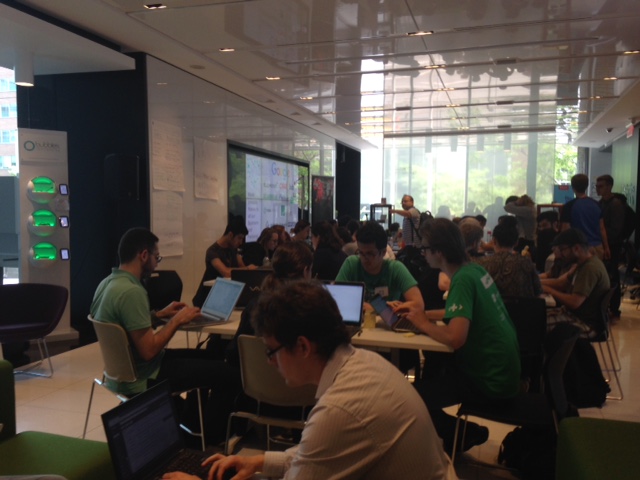Within the first 24 hours of the AI for Social Good Hackathon on the weekend of June 17, Scarlett Muguthi, a 2017 McGill Computer Science graduate, Aanika Rahman, U3 Science, and four other team members had transformed a project idea into a functioning application: A chatbot that translates text to sign language using artificial intelligence (AI).
Drawing on a database of 7,000 words, the chatbot could tell the user how to sign ‘apple’ or ‘analyze,’ ‘robot,’ or ‘rose.’ For the application’s creators, the chatbot exemplified how artificial intelligence can blend creativity and social purpose.
“The reason I joined computer science is because I felt it was the only science that allowed me to put a component of myself in the work that I did,” Muguthi said. “This is why I applied to the machine learning lab.”
The Hackathon marked the midway point of the AI Summer Lab, a program launched by members of the Research Innovation Office in the Innovation@McGill collective. As part of the organization’s goal to promote entrepreneurship at McGill, the project provides opportunities for 20 women to learn more about artificial intelligence. Beginning on June 5, instructors led two weeks of intensive workshops on machine learning for the first half of the lab. Students then applied those lessons to the hackathon and their work on capstone projects during the second half.
Some participants in the lab had studied machine learning for years; some had arrived from related disciplines, but the excitement of getting involved in a rapidly evolving and transformative field was universal among all attendees. Many of the Lab’s students, including Juliette Lavoie, U3 Science, are hopeful that getting involved in AI could allow them to shape the way governments, businesses, and universities adopt the technology.
“I think AI is the new revolution, something that will change society,” Lavoie said. “I want to be in the action and I think the action right now is in artificial intelligence.”
Associate Vice-Principal (Research and Innovation) Angelique Mannella, who coordinated the Lab, brought in mentors from McGill’s Computer Science Department, the City of Montreal, and local businesses, including Element AI and Maluuba. Not only did the experts lead the Lab’s courses, but they also supervised the participants’ capstone projects.
“The individuals supporting the program are from all different community organizations and startups,” Mannella said. “When a community gets behind something, that’s when the results come.”
For Zahra Khambaty, a U2 Arts student and participant interested in leveraging artificial intelligence to reduce discrimination in airport screenings, the instructors’ practical experience illuminated possibilities of how she could apply the technology.
“Mentorship and inspiration are two major things that I have attained from this lab,” Khambaty said.
Beyond teaching participants about practical applications of machine learning, the Lab aimed to cultivate a more inclusive culture for women in AI. In Canada, women represent 3 per cent of the technology industry’s CEOs and less than 25 per cent of the field’s workforce.
Several of the Lab’s participants identified a variety of reasons for the persistence of the gender disparity—factors that pervade most levels of education. Few school activities encourage girls to undertake programming before college, depressing enrollment in Computer Science courses. For example, women make up only a fifth of Advanced Placement Computer Science test takers in the United States. The gap creates a feedback loop at the university level, where the absence of women engineers can deter other women from pursuing the major.
“It is very intimidating to be entering a field where female representation is minimal,” Khambaty said.
To address the issue of gender disparity, the Lab tried to carve a space in which women programmers felt more encouraged to participate than in male-dominated classrooms. As a result, the collaborative atmosphere proved conducive to cultivating relationships with others in the field. By weaving networks among women, programs like the Lab can prevent the gender disparity from materializing in the new AI industry, according to Rahman.
After the program, some students hope to leverage those connections to get jobs in AI. The program kindled Muguthi’s interest in the field, for example, and she hopes to pursue that passion professionally.
“I went through all four years of McGill taking classes I was mildly interested in,” Muguthi said. “Then, I started the program and it's like finally I found something that really interests me in computer science. So I do think I'm going to stay in Montreal […] and try to get my foot through the door.”








